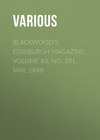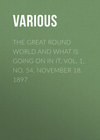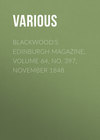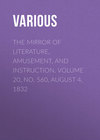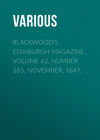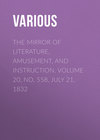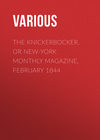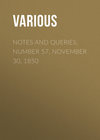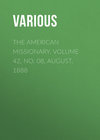Czytaj książkę: «Blackwood's Edinburgh Magazine, Volume 63, No. 391, May, 1848», strona 15
The subsequent career of Peter Williamson, though not all directly our present purpose, is so inviting that we cannot pass it over. He was one of those men who, with no settled purpose of life, have their brains perpetually spinning forth projects, and their hands perpetually putting them in operation. Wherever external circumstances placed him, there his internal nature predestined him turn the opportunities afforded him to the best account. We have seen him exercising the isolated energies of the self-sustaining savage in the wilderness; we shall now see him regulating the complex wheels of mutually dependent civilisation. One of his earliest projects was announced, in 1762, through a letter in the Edinburgh Courant. The drain of able-bodied men by the war had, he stated, prompted him to endeavour to discover some labour-saving machine, to facilitate the operations of the harvest; and he had at considerable expense invented an engine which would, "in the hands of a single man, do more execution in a field of oats in one day, and to better purpose, than it is in the power of six shearers to do. This machine," he continues, "is now completed, and is constructed in such a manner that, when the corn is tolerably thick, it will cut down near a sheaf at a stroke, and that without shaking the grain, or disordering the straw, besides laying down the corn as regularly as the most expert shearer can do." The machine possessed other qualifications far too numerous to be recapitulated here; and though the inventor protested that "neither vanity nor conceit," but the sole desire to serve the public, prompted him to expatiate on its merits, it is not absolutely necessary, at the present day, to join in all his anticipations of its wonderful influence on the amelioration of mankind. We are no authority on the abstruse practical subject of reaping-machines; but justice to our hero renders it right to say that his invention found a place in agricultural nomenclature, as "the basket-scythe."22 We have already mentioned some of his achievements in literature. He published a pamphlet on the Militia: and, contemporaneously with the invention of the scythe, we find him advertising, along with his account of his adventures, that "Commissions from the country will be punctually answered for this and all other sorts of books; as also stationery-ware of all sorts;" and in connexion with this general announcement of a stationery-establishment, he enlarges on another book, apparently of his own composition, called "A General View of the Whole World; containing the Names of the principal Countries, Kingdoms, States, and Islands, – their length, breadth, and capital cities, with the longitude and latitude; also the produce, revenue, strength, and religion of each country." This encyclopedia, political, statistical, and theological, was to be had for six shillings sterling. From such comprehensive themes we find him descending to the object of the following curious advertisement, dated 9th April 1772: —
"This day was published, price one shilling the pack, and sold by Peter Williamson, printer, in the head of Forester's Wynd, Edinburgh, the Impenetrable Secrets which is called Proverb-Cards, containing excellent sentiment, and are so composed, that they discover the thoughts of one's mind in a very curious and extraordinary manner. The explanation of the secret is given gratis with the pack; each set consists of twenty cards, and ten lines upon each card."23
We may here, perhaps, have traced to its invention the well-known toy called "Conversation-Cards," which has enlivened many a little Christmas party. If this be so, the debt of youth in general, to the poor kidnapped boy, is not small.
In 1776 he started a weekly periodical called "The Scot's Spy, or Critical Observer," which appears to have been continued through the following year with the title of "The New Scot's Spy." In the mean time, he kept a tavern, over the door of which he advertised himself as "from the other world." It appears to have been for some time in the Parliament Square, and subsequently in the interior of the Parliament House itself, part of the wide area of which was partitioned into booths. Every now and then he was dropping before the public some invention great or small. Now it was a "new invented portable printing-press;" next, marking-ink for linen, "which stands washing, boiling, and bleaching, and is more regular and beautiful than any needle." But the chief monument of his energy was the establishment of a penny post-office for the city of Edinburgh, which he supported as a private speculation. It appears to have been soon after the year 1780 that he commenced this undertaking, and contemporaneously with it he published a Street Directory. One might suppose that the post-office, the directory, and the tavern, with an occasional invention or pamphlet, would form sufficient occupation, not only for one head, but one family. Williamson, however, must have all his fires full of irons; and so we find that his wife and daughter had to appear before the public as busy as himself in their own department. On the cover of his directory it is intimated, that "Mantua-making is carried on in all its branches as formerly," by "Mrs Williamson and daughter;" who, lest any means of exercising their craft should pass them, by reason either of its insignificance or its gravity, are made to state, that they "engraft silk, cotton, thread, and worsted stockings; make silk gloves, and every article in the engrafting branch, in the neatest manner, and on the most reasonable terms; likewise silk stockings washed in the most approved style; also grave-clothes made on the shortest notice."
One would naturally imagine that all these professions of activity must have indicated a thrifty, industrious, moral, happy home. Alas, no! In 1789 Williamson was obliged to divorce his second wife, the mother of several children; and the revolting details of the inquiry show too plainly that the degraded woman pursued another profession besides those efforts of decent industry which her husband advertised to the world. She, on her part, charged her husband with having acquired tipling habits, and keeping low dissipated company; while she stated that, notwithstanding the considerable sums that passed through his hands in the course of his various speculations, his family were frequently subjected to great privations. The inquiries connected with the divorce exhibit throughout, tokens of sordid squalor, which show that Williamson was little fitted to seize the tides of fortune that so frequently ran in his favour, or to direct his energies into any satisfactory path of self-advancement. Active and turbulent as he had been – dreaded, admired, nay, respected for his services as a citizen – he had never bettered his condition, or risen above the rank of the vagabond. His total want of early education may have unfitted him to take advantage of his opportunities. "The reader," he says, in one of his pamphlets, "will be here asking what school I was brought up at? I shall only tell them, that the extent of it was upwards of four thousand miles, and the height thereof as high as the heavens, governed by Indians of many nations; and regular education is no way taught among them, but handed down from one generation to another; and their records are kept, marked with tomahawks on the outside of trees, and can be distinguished by themselves for centuries back." It might be a sublime school – but not a hopeful seminary for sober citizens. Yet, among Kay's exquisitely hard etchings there is a portrait of Peter, from which it is evident that lie must have been a very handsome worshipful-looking man, with that well-fed self-assured air – that corporation dignity of manner, and citizen urbanity, if one may use the expression, which beseem the corporate officer. Nature and the tailor seem at the moment to have united to represent in his person a Deacon at least, if not a Bailie. He is depicted in conversation with Abyssinian Bruce, and as saying to the haughty Lord of Kinnaird – "There is more truth in one page of my Edinburgh directory, than in all your five volumes 4to; so, when you talk to me, don't imagine yourself at the source of the Nile." Poor Williamson's eventful life came to an end on the 19th January 1769.
THE REPEALER'S WISH GRANTED. – AN IRISH TALE
IN ONE SHORT CHAPTER
24Nobody doubts that there was hot blood – misunderstanding – difficulty – at the beginning. It is clear enough, also, that many arrangements which followed were not of a soothing kind. Nor can it well be denied; – but stop a little! The other side of the question seems to be perpetually consigned to oblivion. Numbers of people are in ecstasies with the year 1782. The wildest democrats of the present day revert with pride to the glimpse of nationality exhibited by Ireland immediately before the Union. The grand choral cry of Repealers is for a Parliament once more in Dublin. Oh, melancholy, deplorable, almost ludicrous inconsistency! The year 1782 and Repeal! The independence of Ireland after 1782 and Repeal! The old Irish Parliament and Repeal! Plunket – a son of Ireland – talked of history being an old almanac. Memorable indeed was the year 1782. But its trophies were, the handiwork of the Saxon. Bright may have been the gleam of independence which succeeded that year. The whole movement owed character and solidity to great Saxon leaders. Conspicuous is the fame of those men who protested with fiery eloquence against the treaty of the Union; and these were all Saxons. It is very strange, but very true, that the sinews and loins of the agitation now-a-days are all begotten of Saxon spirit and Saxon freedom. There is not a letter in the alphabet of self-government – there is not a syllable in the code of municipal law – there is not a sentence in the charter of political liberty – of Ireland, which is not the lesson, the example, or the boon of the Saxon. Every thing that Ireland now demands is an imitation of a Saxon institution. And Ireland only demands these things, because for ages Saxon institution have pervaded her soil, and imbued her people. Grattan and Charlemont are Saxon names. In all the principles for which these remarkable men contended, no vestige of a Celtic idea can be traced. Until the Saxon – conqueror as he was – touched the Irish soil, there did not grow, blossom, or bear fruit any intelligible notion of social order, or public liberty. But the gratitude of nations is not different from the gratitude of individuals. Away with the Saxon!
Can nothing cure the madness? Large practical wisdom in legislation, exuberant boundless prodigality of munificence, are equally unavailing. Away with the Saxon! But disgust may at length do what force never could have done. Honest, sober, orderly folks in Britain begin to cherish strange thoughts. And the wings of thoughts are words outspoken.
Are ye ready, O Milesians! for such a dawn when it breaks?
There was nothing either very bright or very dull about the morning. Yet not a single human being you met was inclined even to whistle merrily or recklessly. And was there, then, silence over the whole land? Very far from it, I assure you. At the harbour of every sea-port, where a vessel of any size could come, there was a most unmistakeable noise. Heavily, steadily, dreadfully, came down along the rugged stones of each quay the continual tread and tramp of armed men, who, coldly and speechlessly as statues, marched towards the ships. But there was no other noise. The officers gave no word of command; nor was any command needed. Unbroken as the stream of the river, hundreds after hundreds, without any clash, or din, or tumult, passed from the solid land on board of the floating bulwarks of Old England, and without a shout or a sigh – without a murmur of adieu – without the momentary radiance of a smile on a solitary face – departed from Ireland. The Saxons were going. The quick strokes of the paddle-wheels whitened the waters; – the sail bellied bigly to the wind. From Erin the Green, the Saxons were GONE. Then rose from earth to sky – what?
For many a day thousands of eyes had been gazing at the bustling scene. At first, the spectacle of such crowds of all sorts of people going leisurely away with all their kith and kin, with all their bag and baggage, brought with it no distinct idea. The first loaded ship which left the harbour with such a freight took its departure beneath a shower of triumphantly derisive shouts. And so did many a vessel afterwards. But people become tired of shouting at the same thing. Likewise, a constant repetition of the same thing, which in certain circumstances will destroy wonder, does in other circumstances beget and spread wonder. The sameness of the business began to be painful. Countless throngs of lookers-on still choked the quay: but the gibe was rarely heard; the cheer had quite died away. It was incredible how time lagged in its flight. Suddenly, once more, a stir ran through these gazing tens of thousands. A feeble cry – more like a cry of pain than of joy – rang from the discord of the innumerable lips. Every body was gone, except the soldiers. Of the hated Saxons, all who lived by the arts or occupations of peace, all were at length away – men, women, and children. The soldiers remained till all their peaceful brethren were safely on the bosom of the treacherous sea – safer than the bosom of ungrateful Ireland. The soldiers now went themselves. It was not an hour or a day, in which that embarkation could be completed. On it went without interruption. And the people stood by, and saw it going on. Why was there not the continuous roar of exultation from moment to moment, as file after file, regiment after regiment, mass after mass of the bloody servants of the Saxon sullenly and silently retreated? Strange, surely, that it was not so! Strange, surely, that there was no whisper all this time from the bystanders! Strange, surely, that the bystanders, as the ships, ship after ship, sailed away with those very Saxon soldiers, began to turn their regards off altogether from the ships, and to fling unquiet doubtful glances one on the other! The detested foreigner was gone; – and was there, therefore, more neighbourly love among those that remained?
What! Erin Mavourneen, is not your emancipation come? Why is there no shout? The Saxons are going. The quick strokes of the paddle-wheels whiten the waters. Where is the pæan of the ransomed and redeemed? The sail bellies bigly to the wind. From Erin the Green, the Saxons are gone. Then rose from earth to sky – what?
Ireland is left to itself – wholly, entirely, absolutely to itself. The Repealer has his wish. The sea runs between Ireland and England – and all that is Irish and all that is English. The cable is cut. The Emerald Isle is adrift. No Saxon soldier pollutes her soil; but not a Saxon shilling glistens in her purse. The British Viceroy is no more; neither is the British Chancellor of the Exchequer any more – THERE. Ireland has got its own parliament. Also Ireland has got its own poor. Not a stiver of English millions now crosses St George's Channel. Not for one death by starvation now is England or the Saxon answerable. Ireland has her own exuberant Exchequer. Ireland pours abundance into the myriad mouths of her famine-stricken People. Shout, then, O Ireland! shout!
The sail bellies bigly to the wind. From Erin the Green the Saxons are gone. The sun of Repeal is at its noon. Then rose from earth to sky – what?
And they looked into the faces of each other with a dull, blank look – and from earth to sky arose the yell of wild despair, of irretrievable confusion, and of maddening perdition.
The Repealer had his wish. The cable was cut. Ireland was adrift – and LEFT TO ITSELF. Order, law, justice, peace, trade, industry, money, prosperity, and – oh terrible truth! – Independence were gone away – quite away with the Saxon.
And the Milesian Republic endured – we blush to number the hours of its ephemeral and horrible existence. Every where the fair face of the beautiful Isle was hideously seamed with scars of civil war. Every where mounted upwards the smoke of roof-trees destroyed, and hearthstones desolated. Every where over the surface of the great surrounding ocean boomed the discordant wail of the land torn by the vultures of anarchy.
Again! at the harbours of sea-ports there was an unmistakeable noise. Over the rugged stones went the continual tramp and tread of armed men, who, with bursts of brutal insolence, marched from the ships. The clang of foreign arms again sounded in the cities, along the plains, and across the hills of Erin. Ireland had become the province of a foreign power which did not speak the English tongue. Ireland was that day trampled on by the iron heel of a new master.
Albion, from its white cliffs, saw the scene. But the ties had been long broken.
THE LAST WALK
BY B. SIMMONS
Oh lost Madonna, young and fair!
O'er-leant by broad embracing trees,
A streamlet to the lonely air
Murmurs its meek low melodies;
And there, as if to drink the tune,
And mid the sparkling sands to play,
One constant Sunbeam still at noon
Shoots through the shades its golden way.
My lost Madonna, whose glad life
Was like, that ray of radiant air,
The March-wind's violet scents blew rife
When last we sought that fountain fair.
Blythe as the beam from heaven arriving,
– Thy hair held back by hands whose gleam
Was white as stars with night-clouds striving —
Thy bright lips bent and sipp'd the stream.
Fair fawn-like creature! innocent
In soul as faultless in thy form, —
As o'er the wave thy beauty bent
It blushed thee back each rosy charm.
How soon the senseless wave resign'd
The tints, with thy retiring face,
While glass'd within my mournful mind
Still glows that scene's enchanting grace.
Ah! every scene, or bright or bleak,
Where once thy presence round me shone,
To echoing Memory long shall speak
The Past's sweet legends, Worshipp'd One!
The wild blue hills, the boundless moor,
That, like my lot, stretch'd dark afar,
And o'er its edge, thine emblem pure,
The never-failing evening star.
The lawn on which the Sunset's track
Crimson'd thy home beside the Glen —
The village pathway, leading back
From thee to haunts of hated men —
The walk to watch thy chamber's ray,
'Mid storm and midnight's rushing wings —
These, these were joys, long pass'd away,
To dwell with Grief's eternal things.
My lost Madonna, fair and young!
Before thy slender-sandall'd feet
The dallying wave its silver flung,
Then dash'd far ocean's breast to meet;
And farther, wider, from thy side
Than unreturning streams could rove,
Dark Fate decreed me to divide —
To me, my henceforth buried Love!
Yes! far for ever from thy side,
Madonna, now for ever fair,
To death of Distance I have died,
And all has perished, but – Despair.
Whether thy fate with woe be fraught,
Or Joy's gay rainbow gleams o'er thee,
I've died to all, but the mad thought
That what was once no more shall be.
'Tis well: – at least I shall not know
How time or tears may change that brow;
Thine eyes shall smile, thy cheek shall glow
To me in distant years as now.
And when in holier worlds, where Blame,
And Blight, and Sorrow, have no birth,
Thou'rt mine at last – I'll clasp the same
Unalter'd Angel, loved on earth.
MAN IS A FEATHERLESS BIPED
I have heard – I saw yesterday that fact enlarged upon in Mrs Thunder's Tales of Passion– that people's hair may be turned gray by intense anxiety, intense fear, intensity of any kind, in a single day. My hair is not exactly gray (far from it, indeed, considering my time of life) – but, if the above physical phenomenon did ever really occur, it ought to be silvery-white. For I have passed through a day, the consequences of which colour, and will colour, my whole existence. Life's fever came to a crisis, and the crisis turned out unfavourably. The threads of my destiny got into a tangle, and Fate in a passion cut the knot with her scissors. My earthly career has been divided into two distinctly-marked portions, and the point where the two are united – the bending-stone (as the Greeks say) of the race-course, is the day on which I was plucked.
Reader of Maga, as your experiences are possibly confined to the land of Maga's nativity, I will explain to you what it is to be plucked. It is to have your degree refused at one of the English universities. Now don't suppose that, when I have said this, I have said all. The mischief does not end with the refusal. It is bad enough, truly, to have gone through three years of reading and walking, or of port-wine drinking and tandem-driving, and then to get nothing for your trouble. But that's not it. A plucking brings with it consequences quite peculiar to itself – consequences hardly intelligible out of England – hardly intelligible, indeed, out of the sphere of the upper classes in England. The English universities are the nurseries of adolescent English gentlemen – of the whole aristocracy, church, and bar. And the many thousand persons comprised in these very extensive denominations, although they may have nothing else in common, agree in fond and not very discriminating reverence for Oxford and Cambridge. I really believe that many a man, whose actual reminiscences of these seats of learning are confined to the pace of the boats and the badness and dearness of the wine, yet manages to persuade himself that his being was somehow exalted by his three years' course. And then the sacredness which attaches to their verdict! A fellow will pass current any where with the university stamp upon him. I know that Muggleton, who got a medal, and is the slowest dummy in creation, used to be invited occasionally to dinner-parties as a substitute for the late S. S. Besides, university life is common ground to half the world. You place Tories and Whigs, high churchmen and low churchmen, round the same table, and there follows a wrangle or a quarrel; but, let the conversation once veer round to the incidents of "Slogger's year," or the character of Dr – , and you will find the talk flowing freely, and opinions unanimous.
So you see the unpleasantness of there being nothing to be said about one, under such circumstances, except that one was plucked. Of Mr Pennefeather, of Elmstead Lodge, Surrey, (my present designation,) little is known in the neighbourhood of the aforesaid Elmstead Lodge, beyond the fact that he and his charming family live there. But the name of Pennefeather of St Saviour's, Cambridge, is common property, and hundreds know it in connexion with certain unfortunate circumstances, already alluded to.
I was always in my college considered rather a reading man. I attended chapel and lecture regularly. I went to few parties or none. Grindham of St John's (the present dean of – ), and Swetter of Trinity (the new Queen's counsel), backed by their respective colleges for the senior wranglership, were old school-fellows of mine, and we continued our acquaintance. By dint of flattering Swetter, and listening to Grindham's endless holdings forth on mathematical subjects, I grew into favour with both. I believe the worthy fellows began to think me one of themselves, – nothing very brilliant, perhaps, but still sure of a decent place in the honour-list. And, indeed, had fate pleased, their influence might have brought things to a better issue. I was induced to keep my outer door scrupulously shut till two o'clock P.M.; and, though I often fell asleep in my chair, and conic sections always made my head ache, I nevertheless made some way. But I was ruined by a flute! I had learned to play in early life – my mother liked me to accompany my sisters; and now the accomplishment, of which I had grown most school-boyishly ashamed, was discovered by a lazy, handsome, perfumed, kid-gloved flaneur of a fellow, Jenkyns of our college, whose rooms were above mine. He was just then getting up a musical association, and of all things wanted a second flute. I have no patience to narrate the steps of the seduction and triumph, – how I resisted his overtures at first, then gave way conditionally, then unconditionally, – how we had meetings, and held committees, and gave concerts, – how the dons first looked suspicious, then indifferent, then applausible, – and how, finally, far conspicuous with my white waistcoat and baton, I led the band on the first anniversary of our foundation, in the presence of the vice-chancellor and a brilliant assemblage of professors and heads of houses. But the degree examination was approaching – unappeasable, inevitable.
Grindham, I confess, had begun to look cold on me; but Swetter, who was a little ambitious of being considered an accomplished gentleman as well as a great mathematician, rather countenanced my proceedings. He never joined us himself – he was a great deal too deep for that – but he largely affected contempt for fellows who maintained that fiddling and reading were incompatible. And indeed, without being in the least aware of it, I had been made, as it were, the pattern-man of our association and the new system. Did any one object to our concerts, rehearsals, and practisings, as occupying too much time, he was referred to Pennefeather of St Saviour's, "a regular leading man, by Jove – pal of Grindham and Swetter – goes home after a concert, and sits up half the night with a wet cloth round his head." So said report – lying as usual; and my fall was the greater in consequence.
The examination was over, and the result was to be announced next morning. I had felt my ideas rather vague on the subject of the questions asked, and half suspected that my answers partook of their looseness. Still I had my hopes – I had covered a good deal of paper with my writing – a wranglership was not so very unlikely. With this conviction I went to bed, and slept, on the whole, very soundly. In the morning I dressed, shaved, and breakfasted, with considerable deliberation; and, just before nine o'clock, walked down to the senate-house. The scene there, on this and like occasions, is sufficiently exciting to an uninterested person – something more than exciting to one in a situation like mine. A crowd of young men, half mad with expectation, beset the doors of the edifice. The fate of themselves and their friends, their bets and the honour of their respective colleges, are at stake. They shout and scream. The doors are thrown open. All rush in. A pandemoniac confusion ensues. Then some patriotic individual volunteers to read aloud the expanded list, and, hoisted on the shoulders of his neighbours, begins, – wranglers, "Grindham, St John's; Swetter, Trinity; Pump, Trinity, ("Hooray!" shouts somebody, and runs off to convey the intelligence to Mr Pump, who is funking in his room) – Mullins, St John's; Shobley, St Saviours; &c., &c." I listened calmly to the first half of the wrangler-list, anxiously to the last, tremblingly to the names in the next class, agonisedly to those in the third and last. My name was not there at all! In the hope that it might have been omitted by mistake, I waited until the crowd thinned, and then, with dim eyes, read the paper myself. There was no mistake at all. I ran, unobserved, to my rooms, locked myself in, and during the next three hours I won't say what I did or thought. There are moments – but never mind! I'm a father of a family now.
The day was verging towards the afternoon when I put on my hat, determined to go out and brave the mocking looks of the undergraduate world. I thought I had some notion of what was to be expected, but the bitterness of the draught surpassed all my anticipations. I had hardly got outside the gate of my college, when there turned the nearest corner a walking party of fifteen gentlemen abreast – the centre-piece was Grindham. The two wings were composed of his admiring, flattering friends. My appearance caused a singular alteration in the countenances of the party. Some looked awkwardly; most of them manifested a strong inclination to laugh; but Grindham himself would have passed without recognising me, had not his neighbour whispered something in his ear. He turned and shook hands – I would have given the world so that he had cut me, for I expected some of that pity which "d – d goodnatured" friendship proffers on such occasions. Alas! my friend had forgotten my position in his own: he did not seem in the least aware that any person except himself and Swetter, the defeated Swetter, had been interested in the late examination. He talked incoherently for some minutes, for repressed exultation was making his eyes dim, and causing his tongue to stutter; and there we stood, he the victor and I not even worthy to be considered the vanquished, chattering on the most indifferent matters – even about that confounded musical association – and neither of us venturing to touch upon the subject which was filling each of our hearts to overflowing. Had any one of the fourteen young men who were tittering together at a little distance, been a cynic or a psychologist, he might have freely fed his humour, or made a valuable addition to his stock of observation. Grindham, Pennefeather – pride struggling hard to be modest; shame striving to gloss itself over with gay indifference – human nature in either case denying and belying itself – what lesson, or what a caricature! But, just before we separated, something seemed to strike my companion. He suddenly became more confused than ever, and then was clearly striving hard to look sentimental. "By the bye, my dear fellow – oh! ah! I was very sorry … better luck next time, eh!" And so we parted. But I had lost my friend.
I proceeded. An indistinct object became visible on the other side of the way, which, as I approached, gradually assumed the form and proportions of a man. It was a figure, not unfrequently seen in my day in the streets of Cambridge: a broad-brimmed, low-crowned hat, which completely concealed the countenance of the wearer, just permitted to loom out of its shadow a many-coloured neckhandkerchief, printed with the flags of all nations. This last cosmopolitan habiliment shone in advantageous contrast to a dogskin waistcoat, of indescribable hue, and immensely broad trousers of white flannel. No coat at all was visible in front, but behind you might perceive that one of bright olive-coloured cloth came sharply out immediately below the arms, – a sporting Newmarket coat, exaggerated to intensity. Such was the outer man of Mr Charles Maxey, of St Saviour's; the inner man was full of all corruption and wickedness. This gentleman, being rather at a loss for occupation amid the uncongenial excitements of the day, was engaged in somewhat roughly schooling a small and horribly ugly terrier puppy to follow him up and down the street. I had no acquaintance with him. I knew nothing of him whatever, beyond the fact that he generally entered the College Hall very much after the proper time, dressed in a rough pilot coat, and invariably swearing violently, as he came in, at some unknown person or object outside the door. But it appeared that, if I had lost one friend, I had gained another. He, who would never have ventured to speak to me before – for the credit of our college, let me say that he was completely and universally cut – now rushed across the street, and shaking me by the hand, bade me "cheer up, (I had flattered myself I was looking tolerably cheerful,) and d – n the concern!" The beast then favoured me with a dissertation on the nature, cause, and consequences of mishaps like mine; in the course of which he explained that his own two pluckings had been entirely owing to the remissness of his private tutor, in not providing cigars at his (the private tutor's) rooms, and thereby failing to render Mr Maxey's studies sufficiently agreeable. "B – and T – ," censoriously remarked that gentleman, "always do it: so I shall go to one of them, and cut old Z – , next term." Finally, he insisted on taking me off to breakfast, (breakfast at two o'clock!) at the rooms of a friend of his, who had been plucked fifteen times, and meant going on to the twentieth plucking, to entitle himself (according to an old Cambridge tradition,) to a gratuitous degree. I accompanied him in passive helplessness, and found a room some thing more than filled with about thirty Maxeys, smoking and singing. I remember it all to this day; – the indescribable songs – the spiced ale – Maxey's story about trotting the gray mare to Newmarket – the jocular allusions to myself – all this comes over me now like a dream of purgatory. The events of that day are indissolubly linked together in my mind; and I can never recall my misfortune without recalling too the meeting with Grindham and the party at the rooms of Mr Maxey's friend. But hard as these things were to endure in our little world at Cambridge, I have since experienced worse consequences of that accursed plucking among grown men, and in a manner made more painful to a sensitive organisation like mine.
